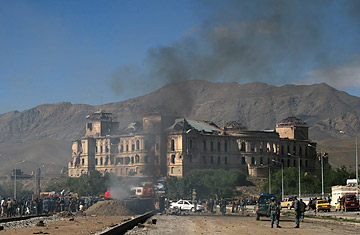
Smoke billows from the site of a suicide car bomb attack in Kabul
(2 of 2)
Indeed, I was not prepared for signs of normality like Afghan Spinneys Super Market, which sells products ranging from Kraft Macaroni & Cheese to bottled Starbucks Frappuccinos; nor did I expect to see girls wearing skinny jeans and heels — albeit paired with long tunics and headscarves — or boys with slicked-back hair and shiny disco shirts.
The U.N. — which pulled its operations from Kandahar because of a deteriorating security situation — still drives through the streets of the capital in SUVs labeled with its initials. And some residential compounds proudly maintain their policy of no armed guards. Foreign residents and prominent Afghans point to these things as signs of just how different Kabul is from the rest of the country — a sort of oasis of relative progress and a refuge for anti-Taliban, business-minded Afghans.
Some expatriates continue to use the handful of well-regarded private taxi companies. The foreigners stay out late on weekends, eating and drinking in luxury restaurants or holding barbecues in the yards of private villas. But while the city can appear packed with commerce, Westerners in Kabul — the contractors, humanitarian aid workers, diplomats, journalists and business people — are conspicuously absent from Kabul's streets, even during bustling weekends. And those whom I talked to admit they don't walk around much anymore, if at all.
Walied Osman, an Afghan American, had two broken arms when I met him. Last week, nine armed men broke into his office over a business-related feud and beat him and his staff with pipes until a staff member managed to escape and call the police. "I came here with a lot of passion, back in 2001," said Osman, who moved to the country of his heritage to work for NGOs before ultimately starting his own business. "[The year] 2005 is when I started noticing the regression: increase in population, increase in crimes, increase in insurgency activities in Kabul. The stories you don't hear about are businessmen who get kidnapped, or whose kids get kidnapped. The sadness of it all is that it's so money-driven here." For Osman, the office beating was the last straw. After nine years, he said, it was time to jump ship.
"There is no security in all of Afghanistan. It's getting worse. And the society is getting worse," Mohamed Sarwar, the owner of a Kabul fruit stand, told me days before the Tuesday blast. "People are not honest with each other. And the way they are dressing — it's more Western and it doesn't match our society. There is also injustice. The people are not committed to the government, and the government is not committed to the people."
Even Sohail, the publisher, admits that "the progress in Afghanistan [is] unbalanced. This type of development is creating conflict, because when people come from other parts of the country to Kabul, they're feeling the difference between their lives and the lives of the people in Kabul."
